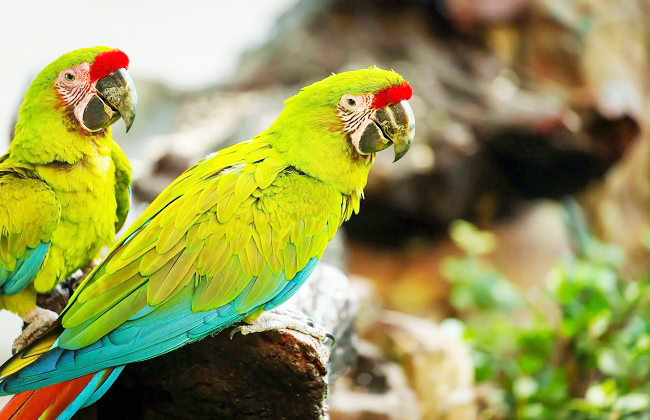
Bangladesh, a signatory nation of CITES (the Convention on International Trade in Endangered Species of Wild Fauna and Flora), has failed to control illegal bird trade and has recently been suspended from the convention.
Data shows that Bangladesh has been importing several species of endangered birds from the international market to sell locally as pets. Of them, the great green macaw (Ara ambiguus), blue-throated macaw (Ara glaucogularis), hybrid macaws, military macaw (Ara militaris), red-crowned parakeet (Cyanoramphus novaezelandiae) and golden parakeet (Guarouba guarouba) are some of the more common ones.
CITES is an international agreement among nations to ensure that the international trade of wildlife, both flora and fauna, does not increase to a level that threatens their survival in nature. The convention categorizes the species into three lists — Appendices I, II and III — based on the level of threat.
Appendix I includes flora and fauna species threatened with extinction globally. These species can only be traded for exceptional purposes, like education and research, and not commercially. Under Appendix II, the species are not immediately under the threat of extinction, but their trade needs to be controlled. Meanwhile, Appendix III includes the species that need the countries’ cooperation with each other for their sustainable existence in the wild.
According to the CITES checklist, Bangladesh has imported most bird species declared in Appendices I and II in the last few years for pet trade.
CITES observed in a notification that many birds traded in Bangladesh are prohibited from commercial use. Their number is decreasing globally, and they need to be protected in their wild habitats. It also recommends that the country establish adequate regulatory measures and act accordingly so that CITES-enlisted bird trade can be stopped.
Bangladesh’s forest department, under the ministry of environment, forest and climate change, is the custodian of the country’s wildlife. When Mongabay contacted the forest department, it acknowledged the issue and claimed that the suspension resulted from some unscrupulous wildlife traders misusing the existing rules.
How the suspension happened
According to an IUCN Bangladesh census, the country is home to 714 species of birds. However, the Bangladesh Wildlife (Conservation and Protection Law) 2012 mentioned 578 species of birds as local, most of which are enlisted in CITES.
A total of 82 private farms are registered in Bangladesh that can trade birds under the Pet Bird Management Rules 2020. Six of them are suspended for various reasons, including violating the rules.
A study showed that birds are the top choice of pet lovers in Bangladesh because they are easy to maintain and cost less to both buy and manage compared to other pets.
Meanwhile, selling local or exotic birds is currently very common in Bangladesh. The people involved in commercial bird trade often openly sell through online advertisements on social media.
Based on the importers’ and exporters’ interests and demands, Bangladesh’s forest department issued a No Objection Certificate (NOC) against each application to proceed further with the specific number of wildlife.
Data says that all of the NOCs issued by the forest department mention the bird species as non-CITES; however, Mongabay checked the imported bird list in Bangladesh between 2020 and 2023 in the CITES checklist and verified many of them as endangered and vulnerable.
“Some importers have been involved in illegal activities like importing CITES-enlisted birds by taking NOC as non-CITES birds from us,” said Imran Ahmed, conservator of forests and wildlife in the forest department, adding that now they are working on controlling the illegal imports with the help of law-enforcement agencies.
Pavel Patha, an ecology and biodiversity conservation researcher, termed the anomalies as ignorance on the part of the forest officials, as they do not have a clear idea about CITES and non-CITES species.
Citing the example of hidden illegal sales of migratory bird meat in the Sylhet region, he said, “Operating some mobile court [or a raid by the administration] against the selling of some birds in [Dhaka’s] Katabon pet market is one of the visible activities of the forest department to check the wildlife trade in Bangladesh.”
“The government should take immediate actions, including building awareness among common people and related government agencies about the importance of wildlife species and halting the business for ecological balance on the Earth,” said Partha, who is also the director of the Bangladesh Resource Centre for Indigenous Knowledge (BARCIK).
Regarding the suspension, Syeda Rizwana Hasan, advisor to the environment ministry, said, “The suspension from CITES is indeed regrettable. I assumed office only a few days back and have instructed the ministry to rectify and address all concerns of CITES promptly. I hope that we will soon be able to get the suspension lifted.”
(This article is republished from Mongabay under Creative Commons License)
Abu Siddique is Mongabay’s Contributing Editor for Bangladesh. He has worked for several of the leading national dailies including Dhaka Tribune, Daily Sun and The Business Standard, and has explored the remotest corners of the country in search of stories.


